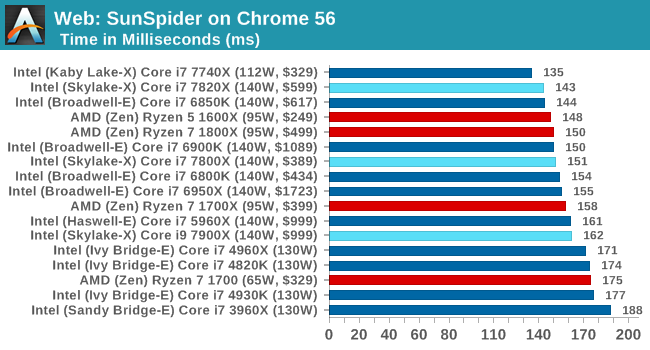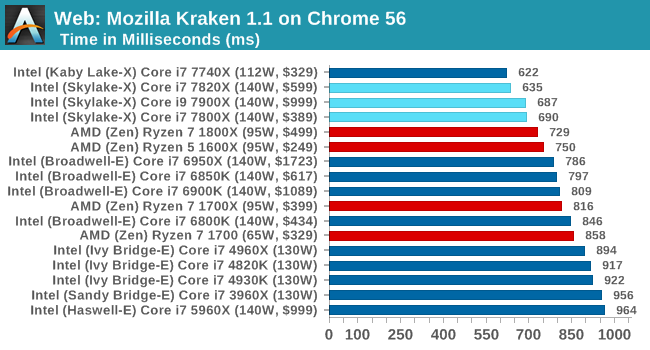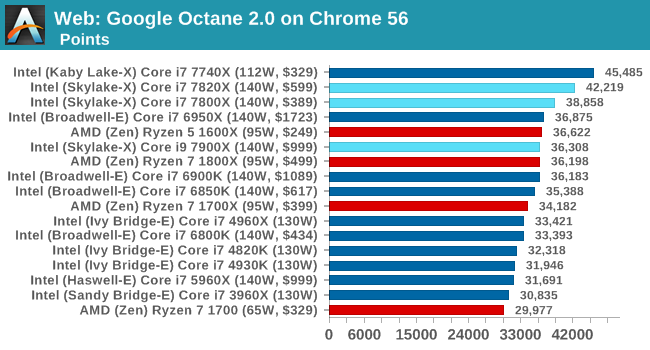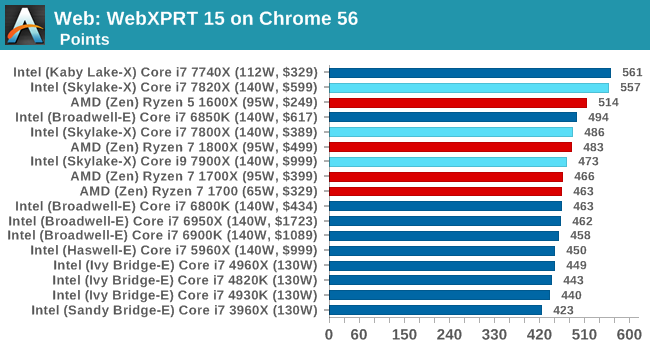The Intel Skylake-X Review: Core i9 7900X, i7 7820X and i7 7800X Tested
by Ian Cutress on June 19, 2017 9:01 AM ESTBenchmarking Performance: CPU Web Tests
One of the issues when running web-based tests is the nature of modern browsers to automatically install updates. This means any sustained period of benchmarking will invariably fall foul of the 'it's updated beyond the state of comparison' rule, especially when browsers will update if you give them half a second to think about it. Despite this, we were able to find a series of commands to create an un-updatable version of Chrome 56 for our 2017 test suite. While this means we might not be on the bleeding edge of the latest browser, it makes the scores between CPUs comparable.
SunSpider 1.0.2
The oldest web-based benchmark in this portion of our test is SunSpider. This is a very basic javascript algorithm tool, and ends up being more a measure of IPC and latency than anything else, with most high-performance CPUs scoring around about the same. The basic test is looped 10 times and the average taken. We run the basic test 4 times.

Sunspider goes after peak frequency most of the time, althoguh there is some variation as it moves into basically becoming a legacy test.
Mozilla Kraken 1.1
Kraken is another Javascript based benchmark, using the same test harness as SunSpider, but focusing on more stringent real-world use cases and libraries, such as audio processing and image filters. Again, the basic test is looped ten times, and we run the basic test four times.

Kraken is more of an intense attack on JS, and still regularly sorts by IPC and frequency.
Google Octane 2.0
Along with Mozilla, as Google is a major browser developer, having peak JS performance is typically a critical asset when comparing against the other OS developers. In the same way that SunSpider is a very early JS benchmark, and Kraken is a bit newer, Octane aims to be more relevant to real workloads, especially in power constrained devices such as smartphones and tablets.

Octane seems to be an optimization target, and with the new Skylake-X it shows.
WebXPRT 2015
While the previous three benchmarks do calculations in the background and represent a score, WebXPRT is designed to be a better interpretation of visual workloads that a professional user might have, such as browser based applications, graphing, image editing, sort/analysis, scientific analysis and financial tools.











264 Comments
View All Comments
Gothmoth - Monday, June 19, 2017 - link
shoody performance.. what are you talking about? stupid games?bios updates will fix that.
could not care less about games. but the intels are faster.. no way around it.
more pricey but faster.
Flying Aardvark - Monday, June 19, 2017 - link
You nailed it. Between the temps and power draw, to jump on this lineup is really silly. I like the 1700 for a small air cooled mITX setup. If I moved to anything else I'd dump all this stuff in the middle and go straight to Threadripper.If you're going for thread count, do it right and get 16C/32T. Or just stick to a nice cool and quiet R5 or R7.
cocochanel - Monday, June 19, 2017 - link
How do they get stomped ? AMD power consumption is about half of that of Intel's.Can you please explain ?
Yongsta - Monday, June 19, 2017 - link
Wow, comparing $1000+ high end enthusiast desktop parts vs $500 and lower consumer desktop parts. Wait for Threadripper and Ryzen7 right now offers a lot more bang for the buck (if you get the 1700 and overclock it).tarqsharq - Monday, June 19, 2017 - link
Those multi-threaded benchmarks are going to get really ugly for Intel in a few months I think, especially from a bang for buck perspective.T1beriu - Monday, June 19, 2017 - link
Wrong name: derba8urReal name: der8auer
Page 6.
Ryan Smith - Monday, June 19, 2017 - link
Thanks!jjj - Monday, June 19, 2017 - link
A lot of talk about the mesh but not testing it, at least the basic memory BW, latency and scaling.No power numbers at all? No OC and temps....
Why focus on perf and ignore all else when perf is more or less a known quantity and the unanswered questions are elsewhere.
For Intel you list all Turbo flavors, for AMD you forget XFR when comparing SKUs.
Luckz - Monday, June 19, 2017 - link
http://www.tomshardware.com/reviews/intel-core-i9-... has you covered re the meshjjj - Monday, June 19, 2017 - link
PCPer tries to look at it too.